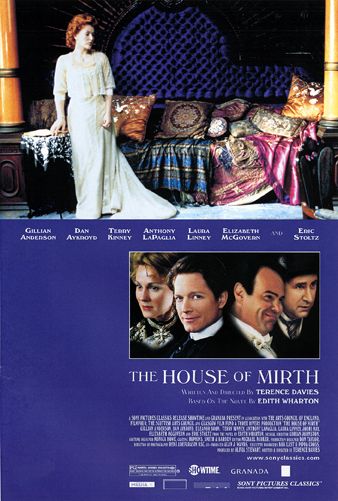“Sinking into Despair”

| None | Light | Moderate | Heavy | |
|---|---|---|---|---|
| Language | ||||
| Violence | ||||
| Sex | ||||
| Nudity |
What You Need To Know:
Unlike other similar period movies, THE HOUSE OF MIRTH refuses to update the dialogue from Edith Wharton’s novel. This is to its credit; it helps give the movie a touch of authenticity. Both Gillian Anderson and Eric Stoltz deliver wonderful performances that make the story enthralling. As Lily continues her downward spiral, she tries to do the right thing, even when it turns out to be very inconvenient. Her morality is not rewarded, however, and she eventually succumbs to despair. This turn of events is what gives the story a humanist worldview, which includes some feminist, anti-capitalist implications
Content:
(H, Fe, ACap, B, C, L, V, S, A, D, MM) Humanist worldview, with some feminist & anti-capitalist implications, about a woman who gets into compromising positions & suffers greatly when she tries to do the right thing, plus talk of going to church; 1 mild obscenity & 5 mild exclamatory profanities such as “Good Lord”; mild violence such as grabbing, slapping & attempted suicide; implied adultery & married man uses his money to take advantage of woman who refuses to succumb, plus some passionate kissing, but not really salacious; no nudity; alcohol use; smoking; and, lying, snobbishness, jealousy, revenge, & gambling debts.
More Detail:
Gillian Anderson of TV’s THE X FILES plays Lily Bart, a ravishing socialite at the height of her success among the upper classes in New York City in 1905. Lily quickly discovers the precariousness of her position when her beauty and charm start attracting unwelcome interest and jealousy. Lily always seems to do the right thing at the wrong time. She also has a talent for getting herself into compromising positions. Trying to conform to social expectations, she seeks a wealthy husband, even though she really loves Lawrence Seldon, a lawyer of modest means played by Eric Stoltz.
Lily’s quest for a husband comes to a scandalous end when she is falsely accused of having an affair with a wealthy married man named Gus Trenor, played by Dan Aykroyd. Gus had tried to take advantage of Lily’s gambling debts, but now she owes him $9,000. Rejected by elite society and her rich friends, she desperately tries to earn the money to pay back Gus. Her pride won’t let her confess her predicament to the man she loves.
Unlike TITANIC and other similar period movies, THE HOUSE OF MIRTH refuses to update the dialogue from Edith Wharton’s novel. This is to its credit; it gives the movie a touch of authenticity, as do the sets and costumes. Both Gillian Anderson and Eric Stoltz deliver wonderful performances that make the story enthralling. Anthony LaPaglia as a wealthy suitor and Laura Linney as a married woman who abuses Lily’s friendship are also well cast.
Lily’s character becomes very admirable as the story unfolds. She tries to do the right thing, even when it turns out to be very inconvenient. Regrettably, however, her morality is not rewarded, and she eventually succumbs to despair. This turn of events is what gives the story a humanist worldview. Thus, Lily never turns to God and Jesus Christ for help. Although Lawrence once expressed his love for her, she decides not to tell him about her money problems. The movie suggests this may be because she is too proud, but it also seems to show she has no faith in his compassion, despite his profession of love. Both she and he display a somewhat cynical view of life, a view that the movie does not counteract. The story of THE HOUSE OF MIRTH also has some feminist and anti-capitalist implications.



